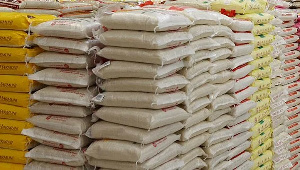Business News of Tuesday, 31 August 2021
Source: www.ghanaweb.com
2021-08-31
 File photo of bags of rice
File photo of bags of rice
The Ghana Rice Millers Association of Ghana are calling for the 50 percent reduction in benchmark value policy to be scrapped.
The benchmark values are references that the customs use in determining standards on imports meant for clearance at the country’s ports.
But the Association in a statement available to GhanaWeb said the policy is rather crippling their businesses as it does not make local rice producers competitive and is rather counterproductive.
Convener of the Rice Millers Association, Yaw Adu Poku pointed that the policy is only beneficial to particularly big importers of rice and other commodities which in turn affects the entire value chain.
“The rice value chain in Ghana provides income to an estimated 500,000 persons engaged in the value chain in Ghana, and all these people are going through very tough times because of the policy. Whereas government has set a target of making Ghana self-sufficient in rice production by 2023, major rice mills are shut down and farmers are abandoning their rice fields, how will such a target be achieved, do you still see the local rice brands on the shelves when you visit the market?,” he quizzed.
Already the Ghana Union of Traders Association have been urging for the benchmark policy to be maintained but the Rice Millers Association on the other hand have bemoaned GUTA’s stance on the policy.
“It is very unfortunate that GUTA appears to be threatening government not to review the policy after 2 years of its implementation. The government has learnt practically that traffic to our ports have not increased as anticipated, this policy only enriches a few importers and not the general population of traders in Ghana as the GUTA seeks to portray,.” Yaw Poku indicated.
Poku adds that the consuming public has however not benefitted from an earlier reduction in the benchmark policy as prices of products have over the past two years not reduced since its introduction.
In 2019, government in a bid to curb the incidents of smuggling and boost revenue generation at the country’s ports slashed the benchmark values for all imports by 50 percent with the exception of vehicle duties which was later reduced by 30 percent.